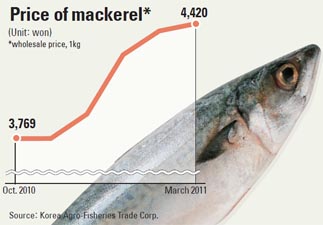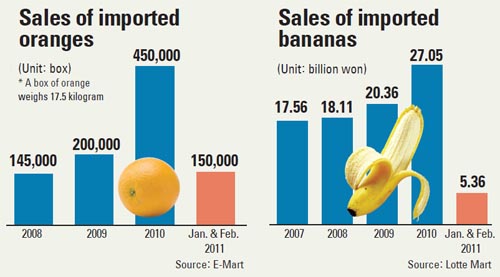
Market Information > 한국 농식품 시장뉴스
한국 농식품 시장뉴스
March 09, 2011
2011.03.09
Vilsack calls for deal's early ratification to increase agricultural exports [English: BYK, CSY]
http://english.yonhapnews.co.kr/national/2011/03/09/52/0301000000AEN20110309000400315F.HTML
Summary: U.S. Agriculture Secretary Tom Vilsack Tuesday called for early ratification of the pending free trade deal with
Foreign Ministry under fire for FTA translation errors [English: BYK]
http://www.koreaherald.com/national/Detail.jsp?newsMLId=20110308000794
Summary: The Ministry of Foreign Affairs and Trade came under fire for mistranslation of the free trade agreement with the European Union which was signed on Oct. 6, 2010. On Monday the ministry announced that it has agreed with the EU to correct yet more errors found in the Korean version of the agreement, less than two weeks after other mistakes were corrected. On Feb. 25, the ministry announced that mistakes regarding the proportion of imported raw materials used in wax and toy products allowed for such products to be eligible for tax exemption under the trade pact will be changed, after the errors were singled out by trade law specialist Song Gi-ho. The changes led to the ministry retracting the bill submitted to the National Assembly and resubmitting the corrected version.
Opposition policy institutes debate KORUS FTA (English, CSY)
The institutes discussed the possibility of renegotiation or abandonment of the FTA
http://english.hani.co.kr/arti/english_edition/e_business/466983.html
Summary: Policy institutes for four of the opposition parties made plans to develop concerted measures by progressive and reformist forces on the South Korea-United States Free Trade Agreement (KORUS FTA). The Democratic Party’s Institute for Democracy and Policies, the Democratic Labor Party’s New Community Institute, the New Progressive Party’s Imagination Institute, the People’s Participation Party’s Participatory Policy Institute, and the Hankyoreh Economic Research Institute held the first in a series of policy debates among four opposition parties’ think tanks Monday in the large conference room of the National Assembly Library. The topic of the event was “The Choice of Progressive and Reformist Forces Regarding the KORUS FTA Issue.”
The National Assembly’s trade committee will review the ratification motion after the government corrects the errors
Following the discovery of discrepancies between the Korean and English texts of the South Korea-European Union Free Trade Agreement (KOREU FTA), the National Assembly’s Foreign Affairs, Trade and Unification Committee made plans Monday to review the ratification motion once again in its legislation review subcommittee after the government corrects the errors. Accordingly, modifications have become inevitable for the Lee Myung-bak government’s schedule for the motion, which they had hoped to pass through the committee Wednesday for introduction at the National Assembly’s plenary session.
Obama asks Congress to start talks on
http://joongangdaily.joins.com/article/view.asp?aid=2933210
2. ECONOMIC ISSUES
Exchange Rates of Asian Currencies Get Stronger as Local Governments Seek a Tool to Fight Rising Inflation Pressure [Korean, OSY]
http://news.donga.com/Economy/3/01/20110308/35412413/1
Summary: It is reported that exchange rates of major Asian currencies have strengthened against U.S. dollar this year as each country made a hard effort to fight the rising inflation pressure. For example, during the last four months, the value of Australian dollar rose by 4.95 percent against U.S. dollar.
Table: Increase in the value of local currency against U.S. dollar during October 2010 – March 2011
|
Country |
|
|
|
|
|
|
|
Increase in value |
1.84% |
2.02% |
3.77% |
1.83% |
1.56% |
4.95% |
Watchdog checking gaps in daily goods prices [English, OYS]
http://english.yonhapnews.co.kr/news/2011/03/08/0200000000AEN20110308008500320.HTML
Summary:
Produce prices have retailers roiling (English, CSY, OYS)
http://joongangdaily.joins.com/article/view.asp?aid=2933211


"MB Prices" Humiliated by 20% Increase in 3 Years Despite Promises of Control; Civic group analyzes government figures (English, CSY)
http://english.khan.co.kr/khan_art_view.html?artid=201103081152117&code=710100
Summary: The "MB Price Index," which consists of essential everyday items, has risen by at least 20% in three years. The results of an analysis of price trends by the Citizens' Coalition and Economic Justice (CCEJ), based on data from Statistics Korea and released on March 7, show that the MB Price Index rose by 20.4% from February 2008 until February 2011. Among the index's 52 items, 10 rose in price by an average of at least 10% every year. The price of baechu (Chinese cabbage) shot up by 114.2%, while those of other items such as garlic (89.8%), onions (74.8%), pork (62.1%) and milk (31.4%) also rose by at least 30% over the three years. Bread (28.4%), apples (28.2%), tofu (26.1%) and toilet paper (22.9%) rose in price by at least 15% during the same period, while gasoline (12.9%) and jajangmyeon (a cheap and popular noodle dish; 12.4%) went up by at least 9%.
http://english.yonhapnews.co.kr/news/2011/03/08/93/0200000000AEN20110308006100320F.HTML
Summary:
Imports of beef from
http://joongangdaily.joins.com/article/view.asp?aid=2933209
Summary:
Food Poisoning Bacteria Found in Powdered Formula[English, OYS]
http://english.chosun.com/site/data/html_dir/2011/03/07/2011030701253.html
4. MARKETING ISSUES
Price of Vitamin C in International Market Declines 30 Percent over the Last Year [Korean, OSY]
http://www.hankyung.com/news/app/newsview.php?aid=2011030843421&sid=0104&nid=004<ype=1
Summary: Price of vitamin C in international market marked $6 per kilogram on March 8, down 30 percent from a year ago. The decline is mainly due to increased production by Chinese suppliers.
The information in this report was compiled by the Agricultural Trade Office (ATO) at the U.S. Embassy in Seoul, South Korea. The press summaries contained herein do NOT reflect USDA, the U.S. Embassy, or other U.S. government agency official policy or view point. U.S. food exporters can learn more about market opportunities in South Korea by reviewing ATO Seoul’s Exporter Guide and other reports available at www.fas.usda.gov by clicking on “attaché reports”.
Agricultural Trade Office, U.S. Embassy - Seoul
Tel: 82-2-6951-6848 Fax: 82-2-720-7921
Email: atoseoul@usda.gov